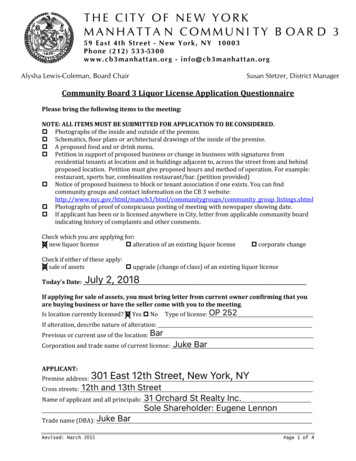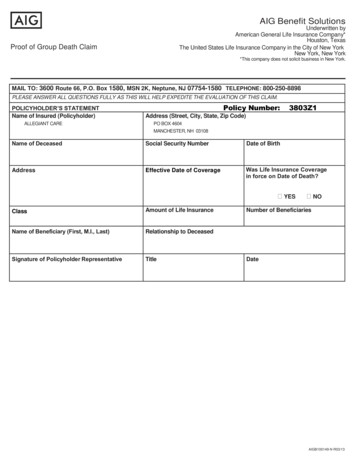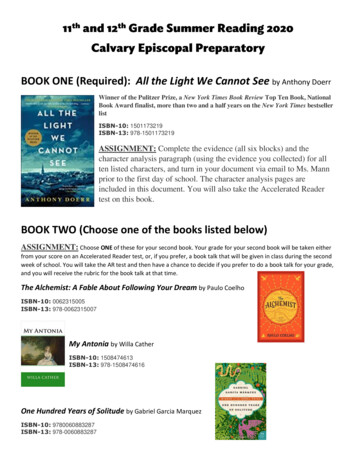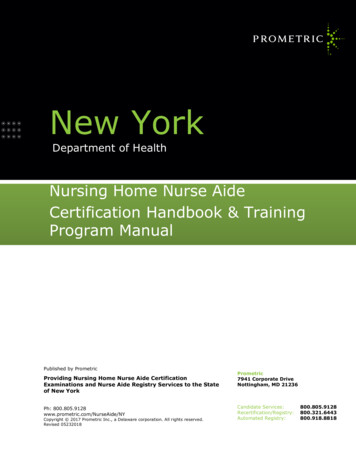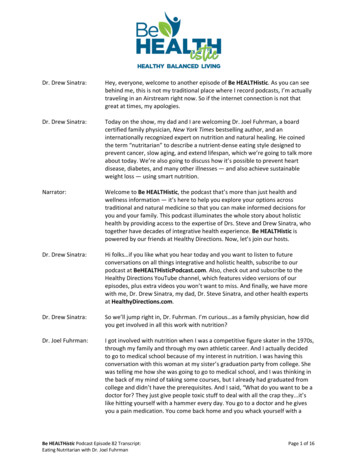
Transcription
Dr. Drew Sinatra:Hey, everyone, welcome to another episode of Be HEALTHistic. As you can seebehind me, this is not my traditional place where I record podcasts, I’m actuallytraveling in an Airstream right now. So if the internet connection is not thatgreat at times, my apologies.Dr. Drew Sinatra:Today on the show, my dad and I are welcoming Dr. Joel Fuhrman, a boardcertified family physician, New York Times bestselling author, and aninternationally recognized expert on nutrition and natural healing. He coinedthe term “nutritarian” to describe a nutrient-dense eating style designed toprevent cancer, slow aging, and extend lifespan, which we’re going to talk moreabout today. We’re also going to discuss how it’s possible to prevent heartdisease, diabetes, and many other illnesses — and also achieve sustainableweight loss — using smart nutrition.Narrator:Welcome to Be HEALTHistic, the podcast that’s more than just health andwellness information — it’s here to help you explore your options acrosstraditional and natural medicine so that you can make informed decisions foryou and your family. This podcast illuminates the whole story about holistichealth by providing access to the expertise of Drs. Steve and Drew Sinatra, whotogether have decades of integrative health experience. Be HEALTHistic ispowered by our friends at Healthy Directions. Now, let’s join our hosts.Dr. Drew Sinatra:Hi folks if you like what you hear today and you want to listen to futureconversations on all things integrative and holistic health, subscribe to ourpodcast at BeHEALTHisticPodcast.com. Also, check out and subscribe to theHealthy Directions YouTube channel, which features video versions of ourepisodes, plus extra videos you won’t want to miss. And finally, we have morewith me, Dr. Drew Sinatra, my dad, Dr. Steve Sinatra, and other health expertsat HealthyDirections.com.Dr. Drew Sinatra:So we’ll jump right in, Dr. Fuhrman. I’m curious as a family physician, how didyou get involved in all this work with nutrition?Dr. Joel Fuhrman:I got involved with nutrition when I was a competitive figure skater in the 1970s,through my family and through my own athletic career. And I actually decidedto go to medical school because of my interest in nutrition. I was having thisconversation with this woman at my sister’s graduation party from college. Shewas telling me how she was going to go to medical school, and I was thinking inthe back of my mind of taking some courses, but I already had graduated fromcollege and didn’t have the prerequisites. And I said, “What do you want to be adoctor for? They just give people toxic stuff to deal with all the crap they.it’slike hitting yourself with a hammer every day. You go to a doctor and he givesyou a pain medication. You come back home and you whack yourself with aBe HEALTHistic Podcast Episode 82 Transcript:Eating Nutritarian with Dr. Joel FuhrmanPage 1 of 16
hammer again in the same spot.” I said, “It’s totally wasteful, what most doctorsdo.”Dr. Joel Fuhrman:And she said, “Well, if you’re so passionate about it, why don’t you go back tomedical school, and be a doctor and change things?” And I said, “Well, I’vethought about that, but I don’t have any prerequisites, I’m already in my career.I graduated from college.” So anyway, I did, I dropped everything, I sold myfamily’s shoe business that I was running, and I went back to the post-graduate,pre-med program at Columbia, specifically to be a physician specializing innutrition. And I wanted to be a family doctor, so I could then do nutrition on alltypes of ages and peoples. And, of course, eventually that woman became mywife, Lisa.Dr. Drew Sinatra:Oh, okay. I’m curious though, in med school, you probably didn’t learn thatmuch about nutrition. You probably learned everything about nutrition outsideof medical school, correct?Dr. Joel Fuhrman:Yeah, absolutely. As a matter of fact, they made me chairperson of the NutritionEducation Committee at University of Pennsylvania. It was funny, because Iwould actually be having these meetings and I’d be walking to my seat in thestadium seating, and the other students.there were older people, but in theirtwenties and things. And they would be hiding their candy bars or their pretzelsbehind their backs, and stuff like that. I’d say, “I’m not your mother. You don’thave to hide it from me!”Dr. Steve Sinatra:So Dr. Fuhrman, you did a residency as well, right?Dr. Joel Fuhrman:I did a family practice residency, that’s correct.Dr. Steve Sinatra:So what was that? Three years of post-graduate training?Dr. Joel Fuhrman:That’s correct. Three years of Dr. Steve Sinatra:So what was it like, being in that training where sometimes nutrition wasbeneficial, and sometimes it was non-existent you know, when you’re doingsurgery and stuff like that.Dr. Joel Fuhrman:Yeah. I did a lot of surgeries and things. But yeah, the training was more likeprison, I think. I equated residency with getting out of prison. You’d mark off thedays in the calendar when you’d be done, “I’m going to be released fromprison.”Be HEALTHistic Podcast Episode 82 Transcript:Eating Nutritarian with Dr. Joel FuhrmanPage 2 of 16
Dr. Steve Sinatra:It’s no doubt about it. Now, today, I think society is more humane in the trainingof a physician as it was years ago, so that’s good.Dr. Joel Fuhrman:Yes, for sure.Dr. Steve Sinatra:Well, Drew, I have a big interest in diabetes — and I’ll tell you why, Joel. Mymother and grandmother both had diabetes, and they both went blind. It waskind of interesting that they met the same demise. I’m a big CoQ10 user, I’vebeen using it for decades. And my mother was riddled with glaucoma andretinopathy. Then, I came across an article about coenzyme Q10 being utilizedin glaucoma today, and also protecting the retina from degeneration. In mygrowth and development, I always feared getting diabetes because, genetically,it’s on my side. But then when I became endowed with CoQ10, and I’ve beenusing for decades — and my family members were using it as well, my sistersand my brother, and none of us have developed high hemoglobin A1Cs. And I’mwondering, being a diabetic expert, do you think CoQ10 might’ve made adifference in delaying the possibility of insulin resistance, or even frankdiabetes, as well?Dr. Joel Fuhrman:Well, it depends on the other risks and the other lifestyle habits that could haveoverwhelmed that beneficial effect. If you were going to be obese and eat a lotof greasy food, fried food, high-glycemic carbohydrates. In other words, if yourdiet was poor, you can’t negate the fact of obesity — and as people get heavier,fat cells spew out lipokines and cytokines and they make you insulin resistantand they produce extra estrogen, throw off your hormones. In other words,what I’m saying is that when your weight is relatively stable and you have a fewextra pounds to lose, maybe that could play a role. But it couldn’t overwhelmthe overall negative effects of being overweight.Dr. Joel Fuhrman:So I’ve did a lot of people with macular degeneration and diabetic retinopathythat reversed it completely. Even the Scheie Eye Institute at University ofPennsylvania had a lot of my patients cancel their surgeries, and were shocked.They even submitted a grant, I think it was a 1.5 million grant to the NIH to doa study on the nutritarian approach. But we were using, to reverse the diabeticretinopathy and the macular degeneration.which actually reversed, not justprevented it. These people were diabetic and they had it — their diabetes wentaway, and their diabetic retinopathy and their macular degeneration went awayat the same time. And of course, a nutritarian diet uses moderate caloricrestriction in a context of micronutrient excellence, eating a lot of greens, andbeans, and onions, and mushrooms.Dr. Joel Fuhrman:Then, of course, if they have macular degeneration, we’re giving them somejuices of one-third one-third one-third. One-third of a green, likeBe HEALTHistic Podcast Episode 82 Transcript:Eating Nutritarian with Dr. Joel FuhrmanPage 3 of 16
lettuce/celery/cucumber, one-third carrot/beet, and one third cruciferous,mostly bok choy. So we’re trying to flood them. Because with the amount of thecarotenoids that are great for the back of the eye in the juices could be 20 timesas much as those rad supplements ophthalmologists give their patients with thecarotenoids, and you absorb them better. They work more effectively whenyou’re getting them from food and juices in the natural state than just takingone or two in a supplement, because you’ve got 100s of them that worksynergistically when you take in the whole dietary program. So I’ve had atremendous success in not just preventing diabetes, reversing diabetes andreversing the eye damage from diabetes.Dr. Steve Sinatra:That’s incredible. I mean, Drew, our listeners can take that one to the bank. Oureyes are precious, and to reverse a retinopathy situation with juicing. Andspecifically, in bok choy, I’m kind of interested — what’s the ingredient in bokchoy that makes a difference?Dr. Joel Fuhrman:It’s the ITCs, the isothiocyanates Dr. Steve Sinatra:Cyanates, right.Dr. Joel Fuhrman: that have the effect to activate the NRF2 transcription protein. And you knowthat when you get these diseases, it’s a build-up of reactive oxygen species andan advanced glycation end products. So it’s the AGEs that build up in aninflammatory environment. So you’re combining the nutrients obviously withthe loss of body weight, and what I’m saying here is quite radical to a degree.I’m saying that even when a person has black band or gastric bypass, you canmeasure their inflammatory markers, their insulin resistance, their diabeticparameters and these things start to get better before they lose all theirweight, as long as they’re dropping at least a kilogram a week.Dr. Joel Fuhrman:We see the same thing, whether we’re measuring inflammatory markers orinsulin levels. Whatever we’re measuring the abnormalities, themyeloperoxidase or oxidized LDL. We’re seeing that people sure get betterwhen they’ve reached an ideal weight with a body fat below 15% for a male,and below 25% for a female to optimize. But we see tremendous improvement,even resolution, before they lose all their weight — as long as they’re droppingthe weight at least the kilogram a week. If they lose weight and then stable itand are still overweight, you start to see the inflammation starts to go up again.But if they’re continuing to lose weight and heading towards that ideal weight,as long as they keep on the program, we see dramatic improvement in themetabolic markers before they’ve lost all their weight even, you follow me?Dr. Steve Sinatra:Right. Oh yeah.Be HEALTHistic Podcast Episode 82 Transcript:Eating Nutritarian with Dr. Joel FuhrmanPage 4 of 16
Dr. Joel Fuhrman:And losing that kilogram a week, that’s really healthy weight loss. There’s nodoubt about it. That’s nice, slow weight loss, which I really endorse, as well.Dr. Drew Sinatra:And Dad, this is really the approach that I think a lot of people are missing outon, is this retreat center approach, really, that Dr. Fuhrman is running. Because,Dad, when you and I are seeing patients one-on-one, there’s only so muchinformation you can give them about nutrition and diet. Then, they need to gohome and make those changes. But if you’re actually at a retreat center, you’rethere with other people that you can relate to, and then you have all thesupport systems and network in place where you can really learn how to cookgood food, and actually what good food tastes like. So Dr. Fuhrman, I want tohear more about this health center you have. First off, how did you create thisthing? And secondly, what’s going on there?Dr. Joel Fuhrman:Thanks, Drew. Well, it’s fun for me because I love doing this stuff. But I’ve beenpracticing out of the office seeing patients for like 30 years. And like you’resaying is right, you give it your all to try to motivate, encourage, teach. And thensome people listen to you, and some people don’t. Because food addiction is sopowerful, and their negative home environment, and the naysayers, and theydon’t fit in with their family, and their friends are saying, “What are you doingthat for?” In other words, with all my work, it’s always a disappointment whenpeople you know are sick and you know they could have gotten well — and theyjust didn’t do what you wanted them to do, and something bad happens. So Iknew that there was a need for a place where people with food addiction andtrouble applying this information could come and stay there for a while.Dr. Joel Fuhrman:It’s like drug rehab. You can’t just go for a week or two. You go for a week ortwo, your taste buds haven’t changed, you haven’t learned enough. Becausepeople get a personality change, and they learn the psychological reasons theyemotionally overeat. And it takes time for them to retrain their tastes, learn theinformation. And also, we give them so much training on food addictioncounseling, but like a drug addiction center with cocaine addicts, you have lessrecidivism when people are off the cocaine for three months. And nothingworks as effective as abstinence. When you have these sugar addicts, or thefried food addicts, they’re salt addicts just telling them to cut out sugar, they’rejust struggling. But once they’re in a place.or cut off smoking even, or stopdrinking alcohol.Dr. Joel Fuhrman:But the point is, once you’re away from those foods for a few months, their holdon you lessens, and you don’t crave them anymore. Then, you can enjoy thenatural flavor in a strawberry or a piece of lettuce or a carrot or something,because your taste buds now get stronger, too. So yes, I’m saying that it givesBe HEALTHistic Podcast Episode 82 Transcript:Eating Nutritarian with Dr. Joel FuhrmanPage 5 of 16
me the ability to increase the probability and almost assure a person’s going tobe able to take what they learn and apply it in their home when they leave, andcontinue to live this way and make progression. As opposed to, they go away tothese healthy retreats, or healthy health centers, and they live there a week ortwo — and they lose weight, and they eat really healthy, and they’re living onsprouts. And they go home and they can’t sustain it. They go back to eating theirold way and they gain the weight back. What good was that? They wasted theirmoney.Dr. Joel Fuhrman:So I wanted to really set up a place where I could assure that people would learnthis, and adapt to it, and be indoctrinated in it so well that when they go home,they have the skills and the ability to stay with it long term. For example, I had agirl who was 19 years old who came in, who was 380 pounds. She didn’t want tobe here, her parents forced her to be here. She was giving me an argument thatshe’s never going to eat this way, what is she wasting her time here? And I said,“Well, you can go home now, if you don’t want to.” But she stayed three and ahalf months, and she went below 300 pounds. She lost 80 pounds in three and ahalf months.Dr. Joel Fuhrman:But she became so nice, she was so grateful to be there, her personalitychanged, her whole purpose in life changed. It was great. We went on hikeswith her, and she really became a different person. She went home and she lostanother a hundred pounds since she’s been home. And she looks great now,and she’s just is so excited about her life now. I see a lot of people, so you feelgood about that. You know that you couldn’t have impacted her if she juststayed a few weeks. She needed to be here a few months to be able to have along-term effect in her life.Dr. Joel Fuhrman:I’ll tell you one more, quick. I had this mayor come from an east coast city, andhis creatinine was 2.5 or 2.6 — so he was out-of-control diabetes, and his bloodpressure when he arrived was like 240/120. And he came straight from thehospital here, because they couldn’t control his blood pressure in the hospital.He was on six different blood pressure medications, and his blood pressure wasstill out of control. So of course, we didn’t just control his blood pressure in thefirst week, but by the time of the second week, he was off all blood pressuremedications with a normal blood pressure. And his diabetes went away, so hedidn’t require any medications.Dr. Joel Fuhrman:He only could stay eight weeks — so at the end of the eight-week stay, Irepeated his creatinine, and everything got better except his creatinine. Hiskidney function was only down to 2.4. So we still got rid of his diabetes, we gotrid of his blood pressure, no medications. He dropped about 35 pounds, but hewas so excited about this. He called me Uncle Joel, he became very excitedBe HEALTHistic Podcast Episode 82 Transcript:Eating Nutritarian with Dr. Joel FuhrmanPage 6 of 16
about living this way. He went home, he lost another 30 pounds, and werepeated his creatinine two months later after he left here — and his creatinine,of course, went back to normal again.Dr. Steve Sinatra:That’s incredible. That’s a great story.Dr. Drew Sinatra:Dr. Fuhrman, walk us through the daily routine of one of these patients thatcome to the center. What happens when they wake up? What do they have forbreakfast? What kind of education do they have before lunch? Walk us throughwhat the whole daily program’s all about.Dr. Joel Fuhrman:Sure. It might change day to day but they wake up, and they usually go for awalk before breakfast. And we have hiking trails, we’re next to a 1000-acre parkwith miles of trails up and down, according to their ability, of course. We havesome great trails. Then, they come back so they go for a walk in the morning,they come back and eat breakfast. Every other day, it depends on the person,but they sometimes have a small glass of vegetable juice with vegetables in it.Then they have with flax seeds, chia seeds, hemp seeds, a little bit of plant milkwith some kind of berries, like blackberries and wild blueberries, and guava orpassion fruit. Some kind of fruit and berry and nut mix. So, they have a lightbreakfast; sometimes they have a little oats mixed in there, but mostly it’sberries and nuts and seeds and stuff like that.Dr. Joel Fuhrman:Then, they have lunch. For lunch, there’s a large salad with a dressing made ofnuts and seeds, and maybe tomato sauce, or some kind of healthy dressing. Nooil, no salt, but they have of course in it arugula, and bok choy, and scallion, andonion, and mushrooms, and cooked mushrooms in there. And maybe somechickpeas, or whatever it is they’re putting on top, sliced tomatoes. They have anice salad, not in a six-inch bowl, a soup bowl, but a full, large bowl like youwould serve a serving bowl, like nine-inch serving bowl salad. Then, they have abowl of vegetable and bean soup, and that might have mushrooms and onionsin it and things. And a piece of fruit for dessert.Dr. Joel Fuhrman:So between breakfast and lunch, they usually either have an exercise class, or ameeting on food addiction, or a lecture, or some kind of group meeting on.sothere’s some kind of usually meeting the morning. Then after lunch, they eitherhave a cooking class, an exercise class, or a water aerobics class. Or they’regoing to the gym, or doing some exercise other than walking. And we have asand volleyball court, which we don’t just use for volleyball. I want them to dolateral motions on the sand. Whether we’re teaching them how to move, howto shift and skip laterally, stop and move back the other direction, and do sidestepping back to center, and to walk and move and back and forth on sandbecause we’re teaching them.because a lot of people get older and they don’tBe HEALTHistic Podcast Episode 82 Transcript:Eating Nutritarian with Dr. Joel FuhrmanPage 7 of 16
fall forward and backwards, they fall to the side, fracture a hip. And being ableto be coordinated, to move rapidly, and push back to center, and develop moreshapely.so we use a lot of exercising where they’re doing lateral motions backand side to side.Dr. Joel Fuhrman:And of course, a whole body exercise. We also have a power plate machine. Oneof the ones that professional football and baseball teams use, where they cando some exercises on the vibrating machine. And we have a full gym, too. Sothey’re doing some kind of other exercise, even if it’s just what they can handlefor a short period of time. And then they have the pool is open, we have thepool heated to 86 degrees, so they have a nice warm pool all year round, saltwater pool, they can either swim or do exercises in the pool.Dr. Joel Fuhrman:And then they have dinner early, at five o’clock. And the dinner consists of someraw vegetables, solid vegetables with a healthy dip, like a hummus dip or a salsadip with raw jicama, or bok choy, or carrots and peppers and cherry tomatoes.They might have raw vegetables. And then they have a cooked vegetable dishwith a delicious sauce, like a Thai sauce, or it may be on a bed of spaghettisquash, or some kind of vegetable entrée. And then a small dessert or frozenfruit dessert. And that marks the end of eating for the day, where they’re thennot eating after six o’clock, except for water or a glass of tea or something.We’re trying to have them have four hours of no food coming in before they goto bed at night. So that’s a basic schedule. Between my lectures, and thecounselors, and the food addiction lectures, and the exercise. And then theyhave free time, a lot of them are on the internet working, still connected withtheir jobs. And the evenings are kind of left free for them to watch a movie, ordo something like that.Dr. Drew Sinatra:That’s great. And so is this 100% plant-based, is there any animal products thatare used?Dr. Joel Fuhrman:No. At the retreat, it’s 100% plant-based.Dr. Drew Sinatra:Got it, got it.Dr. Joel Fuhrman:Because there’s a lot of different reasons why, because people are asking meall the time, “Do you ever have oil on your food? Are you ever pouring oil? Areyou ever eating an animal product? Are you ever having anything off the diet?”And I’m saying, “Well, I’m not a food addict, and I could have something off thediet and go right back to eating healthy the next day.” But for food addicts,especially some of the people we see here, even going off the diet a little bit cantrigger their desire to have more of those foods, and to overdo it, and tocompletely blow up. They need this period of abstinence to develop the taste,Be HEALTHistic Podcast Episode 82 Transcript:Eating Nutritarian with Dr. Joel FuhrmanPage 8 of 16
and to develop the skills to make these foods taste great. We have four chefs,and you would be amazed how great the food tastes. And we teach them howto make the food taste so fantastic with the type of recipes and dressings andthings that we’re making here. So they get skilled, our guests get skilled in beingable to replicate the dishes they like, and things like that, too.Dr. Drew Sinatra:Got it, got it.Dr. Steve Sinatra:You know, Drew, these people are getting so many live enzymes having theselive foods, that it just makes a lot of sense. And Dr. Fuhrman, I really like theidea of all the exercise you’re bringing to that. I mean, you’re a world-classskater, you’re an ex-jock. You know how to bring in the discipline. And I thinkthe discipline that these people go through in your program, I can just envisionit, not going through it myself, but I can envision it, the way you structure it,with the classes, the exercise, the gym, the swimming, etc, etc. I mean, it’s aperfect environment, just a perfect environment.Dr. Joel Fuhrman:You know what’s fun, too? I grow a lot of my own food I put in like 100 exoticfruit trees, and I have the vegetable gardens and beds, and I have special soilwhere it’s so fertile you plant the seed and, wow, this beautiful, gorgeous bokchoy burst up in two weeks. It’s so beautiful taking the food right off the land. Ilove it, for me, the emotional I like working with people, it still keeps my handin my career, without having to work as hard as I used to work. I cut down theamount of hours I’m working, but I still can do the type of work with patients Ienjoy. But also, I can spend more time gardening, and taking care of my fruittrees, and actually living off the land, so to speak.Dr. Drew Sinatra:I’m curious, how do you guys manage the withdrawal effects that some of thesepeople may have — to sugar, to salt? Maybe describe what some of thesewithdrawal effects might look like.Dr. Joel Fuhrman:That’s a good question. The withdrawal effects are most uncomfortable the firstthree to four days. By day five or day six, the people are pretty much fine. It’srare that it continues more than a week. Salt, when you’re on a high-salt dietand they go to such a low-salt diet.because when you’re on a high-salt diet, thekidney gets good at excreting all the extra salt. And the problem is it loses a lotof other minerals in the process, and you lose minerals and salt through yoursweat, too. But when you accommodate long-term to a low-salt diet, you stopexcreting extra minerals and salt in your kidney, and your sweat doesn’t secretemuch salt — so you can run, and sweat, and play tennis, and jog and not getcramping or electrolyte deficient.Be HEALTHistic Podcast Episode 82 Transcript:Eating Nutritarian with Dr. Joel FuhrmanPage 9 of 16
Dr. Joel Fuhrman:But in that short period of time in the first two weeks, when people areswitching from a high-salt diet to a low-salt diet, their kidney is still excreting alot of salt. It hasn’t curtailed that yet, it takes time to curtail that — and theytemporarily could have a dip in sodium in their bloodstream, and their bloodpressure could get too low, and they could feel fatigue. So they could haveenhanced fatigue in the first week or two. But the first few days, they could beheadachy and feel a little bit uncomfortable and agitated. And mostly if they’reon a lot of caffeine, they could be withdrawing from their caffeine, too, whichtakes a couple of days for them to feel better for them. Occasionally a little bitof caffeine in tea or something is okay, but we don’t want people exposed to alot of caffeine, because the withdrawal from caffeine makes people want to eatmore food, because they use food as a means of negating the withdrawal fromthe caffeine. So we don’t want them to confuse the two.Dr. Joel Fuhrman:We want them to get in touch with true hunger, what it feels like to be hungry.So they can start to use hunger as a gauge as to how much calories to eat, toonly eat when they’re hungry and don’t recreational eat when they’re nothungry. And if they’re withdrawing and they’re eating to curtail the agitation —the stomach cramping, the headache, and the weakness — from detoxificationfrom your bad diets, then I call that detox hunger or toxic hunger. Then theyhave to continually eat all the time, because they don’t feel well. So we got toget them no longer dependent on food for maintaining their level of energy,because it’s as a whole misnomer.Dr. Joel Fuhrman:The whole myth is that people think they have to eat to keep their energy up.You feel fine, you don’t need food for energy, you can live off your fat cells.You feel weak if you’re toxic and you’re detoxifying, and you’re not digestingfood, and you feel fatigued. So they’re constantly overeating, it’s because theyfeel wiped if they don’t keep overeating calories — and we get rid of that thefirst week. And then over time, they really feel hunger in their lower part oftheir neck and upper part of their chest, in their neck and throat area. And theycan start to differentiate the withdrawal symptoms from what real hunger feelslike.Dr. Drew Sinatra:I know this will probably change based on who’s coming in, their weight, sex,etc. — but generally speaking, what type of calorie count per day are peopleaiming for at the center?Dr. Joel Fuhrman:Exactly. We may have a person who’s an athlete coming in who has rheumatoidarthritis, or a big person coming in who’s not overweight, let’s say, and theymay need more calories. But generally, most of the overweight people whowere food addicts.and that’s the majority of who our patients are, women whoare overweight who have food addiction, that’s the majority. Most of themBe HEALTHistic Podcast Episode 82 Transcript:Eating Nutritarian with Dr. Joel FuhrmanPage 10 of 16
we’re shooting between 1200 and 1400 calories a day, between 12 and 1400.And that’s a lot of food, when you’re eating so much vegetables, andmushrooms, and onions, and all kinds of dishes. That still could be a lot of foodfor them, and they might even have to moderate that to make sure they’relosing a pound every three days, because we want people to.and most of thepeople don’t. Most of the people are losing 20 to 30 pounds the first month, bythe way. They’re losing more than a kilogram a week.Dr. Joel Fuhrman:But even the people that are relatively slow weight-losers and have moredifficulty keeping that up, we’re monitoring them to make sure they’re droppingapproximately a pound every three days to keep them on track. And what’sfunny is that people say you can’t age backwards, you can only slow the agingprocess, but that’s not true. You can age backwards, because we can dotelomere tests and we can do all kinds of.and we see that these things, afterthree months of eating so healthily, they’re telomeres show they’re 10 or 20years younger. You can see the way they look, and they feel, and their skin. Ithas an anti-aging effects.Dr. Steve Sinatra:Hey Joel, I’m curious. What percentage of fat is in the diet? You’re giving themall fresh fruits and vegetables, and some soups, etc, etc. But have you everfigured out how many carbs are in the diet, grams of protein, carbs and fats,etc?Dr. Joel Fuhrman:Yeah, absolutely. Because believe it or not, one of the most striking findings inthe last decade in the history of nutritional science has been by the AdventistHealth Study 2 that has 17 other
Dr. Joel Fuhrman: It’s the ITCs, the isothiocyanates Dr. Steve Sinatra: Cyanates, right. Dr. Joel Fuhrman: that have the effect to activate the NRF2 transcription protein. And you know that when you get these diseases, it’s a build-up of reactive oxygen species and an advanced gly


